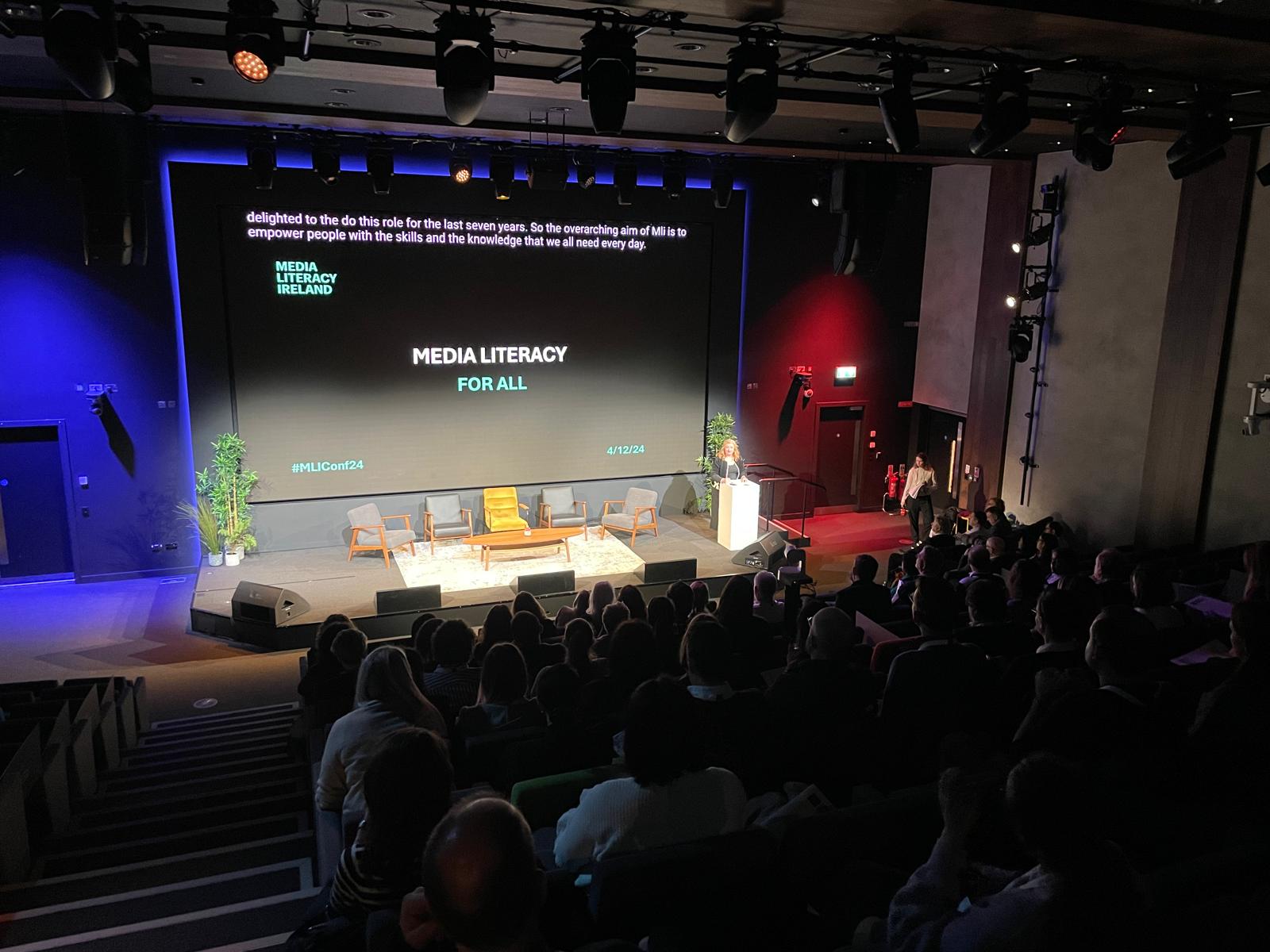On 4 December 2024, the Media Literacy Ireland annual conference took place at the Foundry in Dublin, kindly hosted by Google. MLI would like to thank Coimisiún na Meán, Google and all of the speakers, panellists, and attendees for making it such a success
The theme of the conference was ‘Media Literacy for All’ and the event provided the media literacy community in Ireland an opportunity to connect, collaborate and exchange ideas about what the promotion of media literacy will look like in the coming years. The audience of over 80 people, representing many different sectors, reflected the diversity of MLI and we were delighted to welcome colleagues from the UK and Moldova also.
You will find some of the highlights below, and a full recording of the conference is now available to watch online here.
Following opening remarks from Ryan Meade of Google and Rónán Ó Domhnaill, Commissioner for Media Development at Coimisiún na Meán, National Coordinator for MLI, Martina Chapman set the scene by highlighting the remarkable achievements of MLI over the past year, emphasising its success across four key pillars: coordination, innovation, communication, and promotion. Watch Now
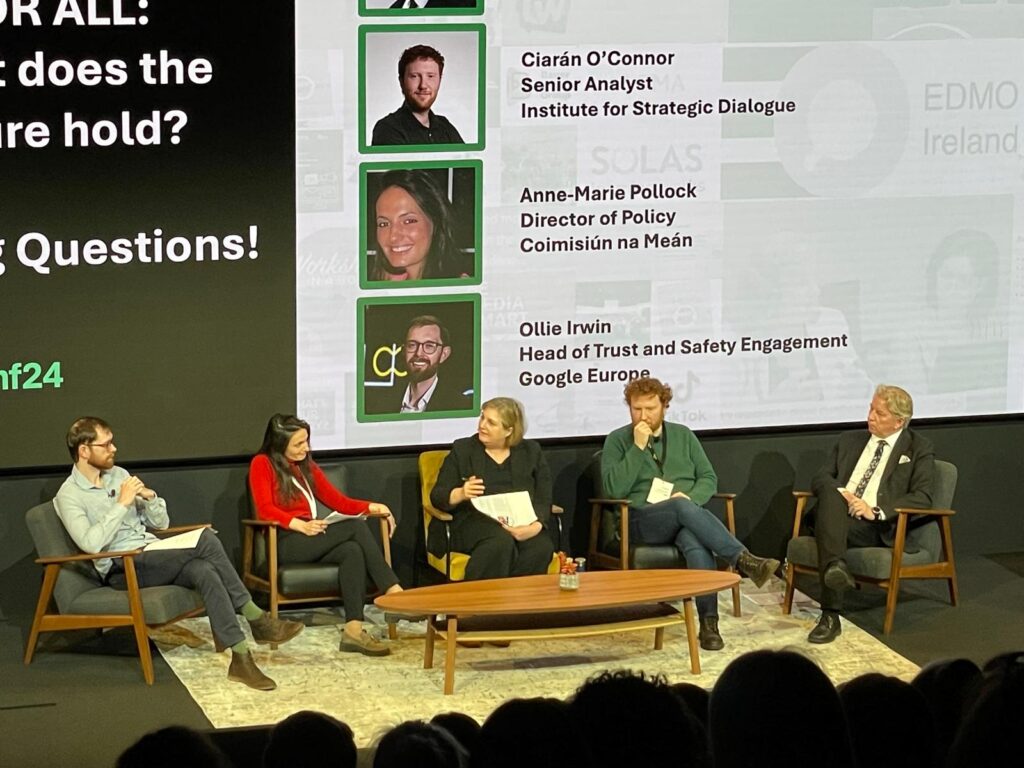
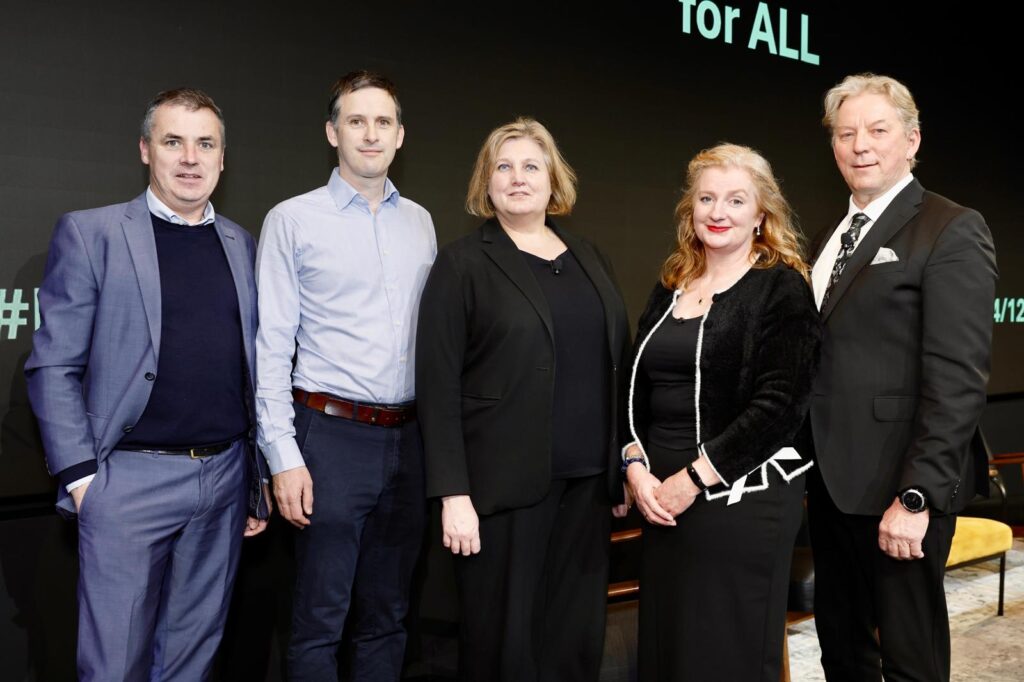
Keynote: ‘Building resilience from the cradle to the grave’
Dr. Leo Pekkala, Deputy Director of the National Audiovisual Institute in Finland delivered the keynote speech which reminded us all of the evolution of media literacy and how media education has been integrated into Finland’s school curriculum and developed over five decades. He highlighted the importance of critical media literacy and the role of trust in society. Finland’s approach includes cross-curricular media literacy within the national core curriculum, starting from early childhood education. Despite a decline in media literacy programmes in the third level sector, a government office was established in 2012 to promote media literacy, leading to a national policy in 2013. Dr. Pekkala noted the need for a holistic approach to education, focusing on trust rather than restrictions and ‘slow thinking’ to foster resilient, informed citizens. Watch Now
Media literacy for all: What does the future hold? The Big Questions
For the main panel discussion, Dr Pekkala was joined by three subject matter experts to explore the factors that are likely to impact media literacy developments in the near to mid-term future. Moderated by Stephanie Comey, Director of Media Literacy and User Education for Coimisiún na Meán, this session provided both context and thought-provoking questions for the audience to consider during the breakout session later.
Ciaran O’Connor from ISD underlined the importance of information integrity and the negative effects of mis- and disinformation on society and democracy. Anne Marie Pollock (Coimisiún na Meán) drew connections between media literacy, media regulation, media pluralism and the health of our democracy. The final intervention was from Ollie Irwin (Google) who explored the role of AI.
The expert insights sparked lively conversations about the evolving challenges and opportunities in the media landscape. The session concluded with the panelists posing four key questions that they encouraged the audience to discuss during a breakout session. Watch Now
Lightning Talks: Embedding media literacy in communities
Acknowledging that the provision of media literacy for all will involve embedding media literacy in the heart of communities, the Lightning Talks session provided an opportunity for practitioners in this space to share the secret of their successes with attendees. Moderated by Martina Chapman the session started with a series of very short interventions about inspiring case studies of media literacy initiatives embedded within communities.
Megan O’Regan Byrne from Beat 102-103 presented the award-winning Digital Media & You Tour. Conor Keogh from UCD took the audience through the Digital Media Literacy Module for MA students. Christina Nicolotti Squires demonstrated the approach taken by Ofcom in the UK. Tony Daly from 80:20 illustrated the innovative Questions Matter project and Jane McGarrigle highlighted the work of Webwise.
The session concluded with a thought-provoking ‘lessons learned’ discussion, where there was overwhelming agreement that community projects need to meet people where they are and that working with the right community-based partners is critical. The importance of research and co-creation was also highlighted. Watch Now
Media Literacy in the Age of AI
Dr. Eileen Culloty (MLI Co-Chair) moderated a captivating discussion with Dr. Dónal Mulligan (DCU) and Dr. Aphra Kerr (UCD), exploring Artificial Intelligence (AI) through a media literacy lens. The panel delved into the essential skills and knowledge needed fully to harness the potential of AI, particularly in the areas of storytelling, content creation, and media production. The speakers highlighted how AI is transforming the media landscape and unlocking new creative opportunities while also addressing the ethical considerations necessary to ensure a positive, responsible, and media literate approach. The session provided valuable insights into how the media literacy community can best equip individuals to navigate and engage with AI technologies. Watch Now
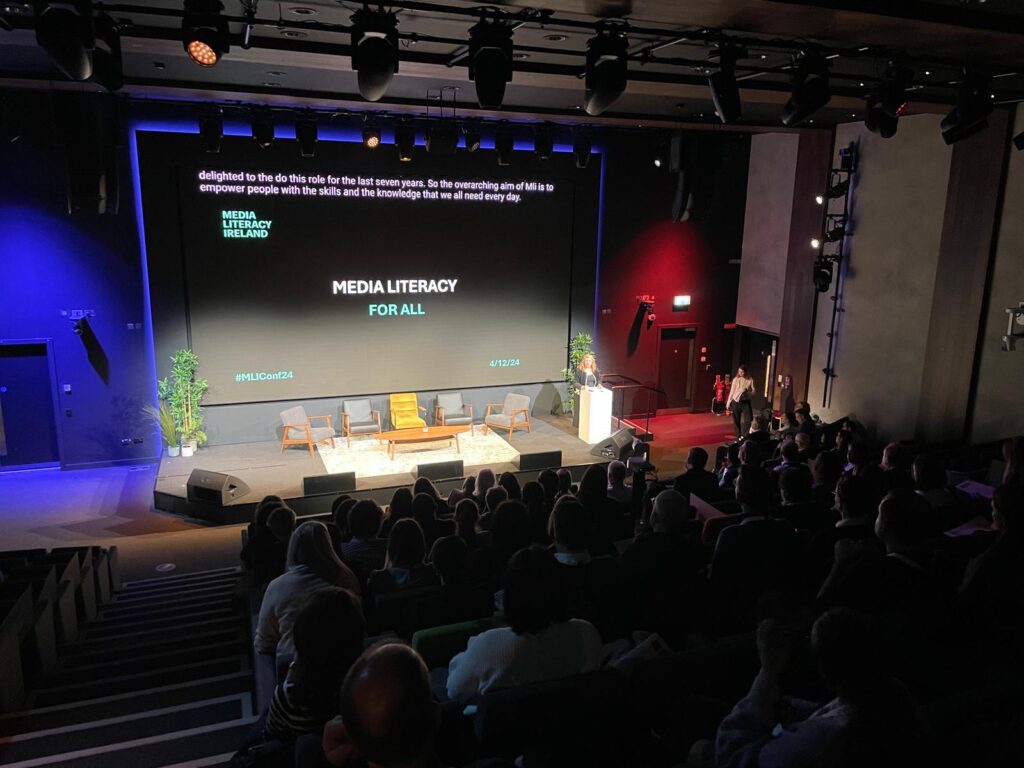
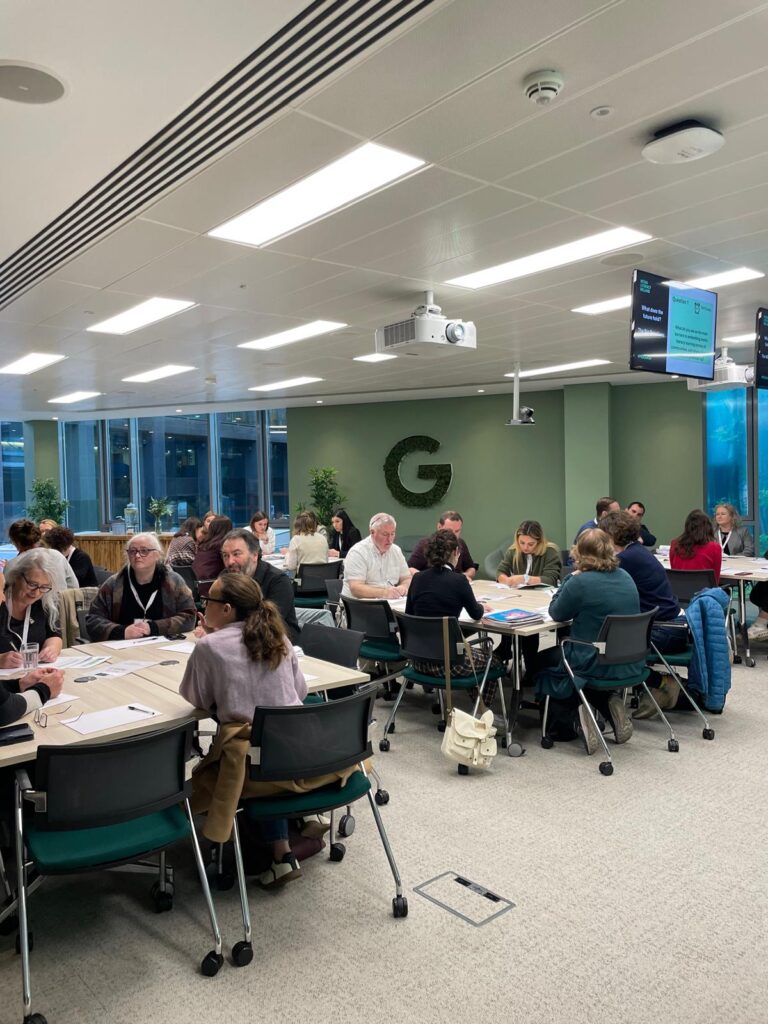
Media literacy for all: What does the future hold? The Big Questions- the Answers!
During this final session, four members of the MLI Steering Group presented a summary of the answers to the four Big Questions posed earlier and discussed during the breakout sessions.
Question 1: What do you see as the main barriers to embedding media literacy learning across all communities and where does the untapped potential lay?
Responding to Question 1, Brian Greene from Craol said that funding, time and space were some of the main barriers identified. He highlighted the elderly, migrant communities and people with additional learning needs as being particularly hard to reach but equally recognised that this was where some of the main untapped potential lay.
Question 2: How can the media literacy community promote the skills and knowledge needed evaluate and assess information from all sources?
Eileen Morrisey of the Library Association of Ireland presented a summary of the responses to Question 2. She described critical thinking as a key skill to support communities and noted that no group is immune to falling for scams, misinformation and disinformation. Ongoing, regional initiatives rooted in local communities were seen as being particularly effective for promoting the skills and knowledge required to assess information from all sources.
Question 3: How can the media literacy community help citizens develop the skills and knowledge needed to recognise and value the role that media regulation, media freedom and media pluralism plays in a healthy democratic society?
For Question 3, Teresa Hanratty from Learning Waves highlighted the use of simplified language and better storytelling to help citizens value the role of media regulation. She also said that we need to meet people where they are at, in terms of the platforms used and content consumed, and that freedom of expression is important to prevent distrust.
Question 4: How can the media literacy community help citizens develop the skills and knowledge needed to maximise the opportunities that AI offers and result in positive experiences when using AI products?
Question 4 prompted quite a range of responses, with one group rejecting the question and focusing their discussion instead on what AI might be used for. Máire Aoibhinn Ní Ógáin from TG4 summarised the feedback and said that it is important that we tell the story of AI objectively and with a critical thinking lens, highlighting the pluses and minuses of its use. She also raised the issue of equality and asked how we ensure that AI doesn’t result in more inequality. Watch Now
Networking is an important aspect of MLI events and there were plenty ofopportunities for attendees to meet and mingle with other MLI members over coffee break and lunch break. If you want to be reminded of some of the action some photos from the day can be found here. Attendees also had the opportunity to attend engaging demonstrations over lunch by Webwise and the Adapt Centre.
If you attended the conference, we hope you enjoyed it as much as we did. If you didn’t get the chance to attend, please do take a look at the highlights. There is something for everyone. For more information about future events visit our website and don’t forget to subscribe to our newsletter for the latest updates.
